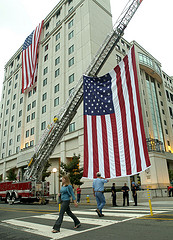 A decade after the September 11th attacks on the United States and its people, we took a look back to see how those events specifically shaped and changed the travel insurance industry.
A decade after the September 11th attacks on the United States and its people, we took a look back to see how those events specifically shaped and changed the travel insurance industry.
As a result of the September 11th attacks, travel insurance evolved to re-define the coverage for events such as these and added coverages to help ease travelers’ concerns, including:
- Trip cancellations expanded to include terrorism – specifically, terrorism and terrorist attacks is well defined in travel insurance policies, and some policies allow travelers to cancel their trip for a full refund if a terror attack occurs at their intended destination within 30 days of their arrival. Read about Terrorism and Mandatory Evacuation coverage. It’s important to understand that an attack defined as being a terrorist event must occur within the defined time frame in order for a traveler to make a cancellation claim. If you’re simply worried an attack will occur, you’ll need the following coverage.
- ‘Cancel for any reason’ is a new addition – after the September 11th attacks, people were very uneasy with the idea of flying and many simply chose not to. ‘Cancel for any reason’ coverage extends the covered reasons for trip cancellation and allows nervous travelers to cancel their trips for 50%-100% of their trip costs back depending on the plan.
- Security evacuations were added too – when a travel encounters a dangerous situation such as a military coup, a civil uprising, or impending natural disaster, they can request rescue from their travel insurance company if they have this coverage. Travelers who simply cannot avoid travel to hot spots find great comfort in knowing they can tap into a coordination team and resources to help them get to safety.
Not all travel insurance plans have these coverages, so as always, it’s important for the traveler to read and understand their travel plan certificate. That document will outline specifically what your coverage includes and, sometimes more importantly, what is specifically excluded.
